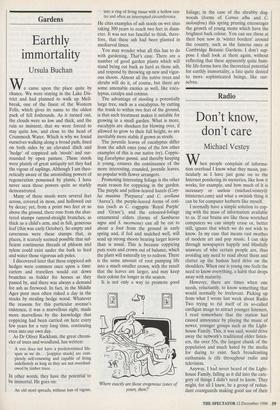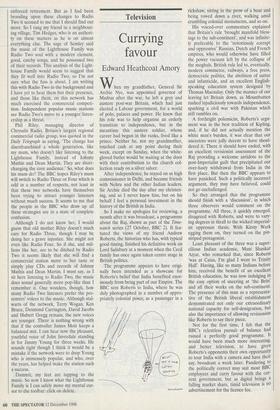Radio
Don't know, don't care
Michael Vestey
When people complain of informa- tion overload I know what they mean, par- ticularly as I have just gone on to the Internet pondering its mysteries, like how it works, for example, and how much of it is necessary or useless (michael.vestey@ btintemet.com) and what a swinish thing it can be for computer herberts like myself.
I normally have a simple solution to cop- ing with the mass of information available to us. If our brains are like these wretched computers we can simply erase or, better still, ignore that which we do not wish to know. In my case that means vast swathes of modem art and pop music. I can skip through newspapers happily and blissfully unaware of who certain people are, thus avoiding any need to read about them and clutter up the human hard drive on the shoulders. When one is young one feels the need to know everything, a habit that drops away with maturity.
However, there are times when one needs, reluctantly, to know something that would normally be irrelevant. Picking up from what I wrote last week about Radio Two trying to rid itself of its so-called cardigan image to attract younger listeners, I read somewhere that the station had caused annoyance by playing the music of newer, younger groups such as the Light- house Family. This, it was said, would drive away the network's traditional older listen- ers, the over 55s, the largest chunk of the population and much hated by the media for daring to exist. Such broadcasting euthanasia is rife throughout radio and television.
Anyway, I had never heard of the Light- house Family, falling as it did into the cate- gory of things I didn't need to know. They might, for all I knew, be a group of redun- dant coastguards making good use of their enforced retirement. But as I had been brooding upon these changes to Radio Two it seemed to me that I should find out more. So I rang my friend in a neighbour- ing village, Tim Hedges, who is an authori- ty on these matters as he is on almost everything else. The sage of Semley said the music of the Lighthouse Family was Radio Two soul with a modern element, good, catchy songs, and he possessed two of their records. This analysis of the Light- house Family would seem to suggest that they fit well into Radio Two, so I'm not sure what the fuss is about. I am writing this with Radio Two in the background and I have yet to hear them but their presence, and those like them, on this network has much exercised the commercial competi- tion. Independent popular music stations see Radio Two's move to a younger listen- ership as a threat.
Phil Riley, managing director of Chrysalis Radio, Britain's largest regional commercial radio group, was quoted in the Daily Telegraph as saying, 'The change has disenfranchised a whole generation, like my mum, who doesn't like listening to the Lighthouse Family, instead of Johnny Mathis and Dean Martin. They are short- changing the core audience.' So, what does his mum do? The BBC hopes Riley's mum will switch to Radio Three or Four which is odd in a number of respects, not least in that these two networks have themselves been trying to attract younger listeners without much success. It seems to me that the people in the BBC who draw up all these strategies are in a state of complete confusion.
Although I do not know her, I would guess that old mother Riley doesn't much care for Radio Three, though I may be doing her a grave injustice. She might not even like Radio Four. So if she, and mil- lions like her, are to be ditched by Radio Two it seems likely that she will find a commercial station more to her taste or simply play CDs and records of Johnny Mathis and Dean Martin. I must say, as I sit here listening to Radio Two, the music does sound generally more pop-like than I remember it. One wonders, though, how many Radio Two listeners prefer the pre- senters' voices to the music. Although stal- warts of the network, Terry Wogan, Ken Bruce, Desmond Carrington, David Jacobs and Hubert Gregg remain, the new voices are younger. There is nothing wrong with that if the controller James Moir keeps a balanced mix. I can hear now the pleasant, youthful voice of John Inverdale standing in for Jimmy Young for three weeks. He sounds right though I think it would be a mistake if the network were to drop Young who is immensely popular, and who, over the years, has helped make the station such a success.
Dammit, my feet are tapping to the music. So now I know what the Lighthouse Family is I can safely move my mental cur- sor to the toolbar: click on delete.











































































 Previous page
Previous page